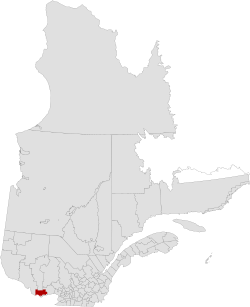Les Collines-de-l'Outaouais Regional County Municipality
Les Collines-de-l'Outaouais (French pronunciation: [le kɔlin də lutawɛ], "The hills of the Outaouais") is a regional county municipality in the Outaouais region of western Quebec, Canada. The region nearly encircles the City of Gatineau, which is to the south. Its administrative seat is in Chelsea, Quebec.
Les Collines-de-l'Outaouais | |
|---|---|
 | |
| Coordinates: 45°33′N 75°52′W / 45.550°N 75.867°W[1] | |
| Country | |
| Province | |
| Region | Outaouais |
| Effective | December 4, 1991 |
| County seat | Chelsea |
| Government | |
| • Type | Prefecture |
| • Prefect | Marc Carriere |
| Area | |
• Total | 2,199.30 km2 (849.15 sq mi) |
| • Land | 1,912.05 km2 (738.25 sq mi) |
| Population (2021)[3] | |
• Total | 53,657 |
| • Density | 28.1/km2 (73/sq mi) |
| • Change 2016-2021 | |
| • Dwellings | 24,627 |
| Time zone | UTC−5 (EST) |
| • Summer (DST) | UTC−4 (EDT) |
| Area code | 819 |
| Website | www |
| [4] | |
It was created in January 1991 when the Communauté régionale de l'Outaouais (Outaouais Regional Community) was split into Les Collines-de-l'Outaouais RCM and the Communauté urbaine de l'Outaouais (Outaouais Urban Community, now City of Gatineau). The region is home to the majority of Gatineau Park. It is bisected by the Gatineau River which flows from north to south. The Ottawa River forms the southwestern boundary.
Subdivisions
editThere are six subdivisions within the RCM:[2]
- Municipalities (6)
Demographics
edit| 2021 | 2016 | 2011 | |
|---|---|---|---|
| Population | 54,498 (+11.0% from 2016) | 49,094 (5.8% from 2011) | 46,393 (10.4% from 2006) |
| Land area | 2,025.38 km2 (782.00 sq mi) | 2,051.77 km2 (792.19 sq mi) | 2,048.24 km2 (790.83 sq mi) |
| Population density | 26.9/km2 (70/sq mi) | 23.9/km2 (62/sq mi) | 22.7/km2 (59/sq mi) |
| Median age | 42.0 (M: 42.4, F: 41.6) | 41.8 (M: 42.1, F: 41.5) | 40.4 (M: 40.6, F: 40.1) |
| Private dwellings | 25,105 (total) 21,103 (occupied) | 23,164 (total) | 22,056 (total) |
| Median household income | $110,000 | $90,482 | $85,789 |
| Year | Pop. | ±% |
|---|---|---|
| 1986 | 20,355 | — |
| 1991 | 28,894 | +42.0% |
| 1996 | 33,680 | +16.6% |
| 2001 | 35,188 | +4.5% |
| 2006 | 42,005 | +19.4% |
| 2011 | 46,393 | +10.4% |
| 2016 | 49,094 | +5.8% |
| 2021 | 54,498 | +11.0% |
Ethnicity
editSource: 2021 Census [3]
- 92.0% White
- 4.9% Indigenous
- 3.1% Visible Minority
Transportation
editAccess routes
editHighways and numbered routes that run through the municipality, including external routes that start or finish at the county border:[9]
See also
editReferences
edit- ^ "Banque de noms de lieux du Québec: Reference number 269051". toponymie.gouv.qc.ca (in French). Commission de toponymie du Québec.
- ^ a b c "Répertoire des municipalités: Geographic code 820". www.mamh.gouv.qc.ca (in French). Ministère des Affaires municipales et de l'Habitation.
- ^ a b c "Census Profile, 2021 Census: Les Collines-de-l'Outaouais, Municipalité régionale de comté [Census division], Quebec - Notre-Dame-de-la-Salette, Municipalité (MÉ) [Census subdivision], Quebec". Statistics Canada. Retrieved May 16, 2023.
- ^ a b "2021 Community Profiles". 2021 Canadian census. Statistics Canada. February 4, 2022. Retrieved 2023-10-19.
- ^ "2016 Community Profiles". 2016 Canadian census. Statistics Canada. August 12, 2021. Retrieved 2019-12-20.
- ^ "2011 Community Profiles". 2011 Canadian census. Statistics Canada. March 21, 2019. Retrieved 2019-12-20.
- ^ "2006 Community Profiles". 2006 Canadian census. Statistics Canada. August 20, 2019.
- ^ "2001 Community Profiles". 2001 Canadian census. Statistics Canada. July 18, 2021.
- ^ Official Transport Quebec Road Map